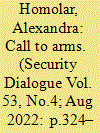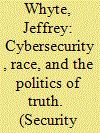|
|
|
Sort Order |
|
|
|
Items / Page
|
|
|
|
|
|
|
| Srl | Item |
| 1 |
ID:
187116


|
|
|
|
|
| Summary/Abstract |
The rhetoric leaders use to speak to domestic audiences about security is not simply bluster. Political agents rely upon stories of enmity and threat to represent what is happening in the international arena, to whom and why, in order to push national and international security policy agendas. They do so for the simple reason that a good story is a powerful political device. This article examines historical ‘calls to arms’ in the United States, based on insights from archival research at US presidential libraries and the United States National Archives. Drawing on narrative theory and political psychology, the article develops a new analytic framework to explain the political currency and staying power of hero–villain security narratives, which divide the world into opposing spheres of ‘good’ and ‘evil’. Shifting the conceptual focus away from speakers and settings towards audience and affect, it argues that the resonance of hero–villain security narratives lies in the way their plot structure keeps the audience in suspense. Because they are consequential rhetorical tools that shape security policy practices, the stories political agents tell about security demand greater attention in the broader field of international security studies.
|
|
|
|
|
|
|
|
|
|
|
|
|
|
|
|
| 2 |
ID:
187117


|
|
|
|
|
| Summary/Abstract |
This article explores the racial politics underwriting cybersecurity’s recent human turn toward the issues of online disinformation and ‘foreign influence’ in US politics. Through a case study of the Black Lives Matter (BLM) movement, this article’s first half considers how contemporary cybersecurity has produced ‘racial division’ as an object of security by framing the BLM movement as a geopolitical vulnerability open to foreign manipulation through social media. In its emphasis on the political protest as a site of insecurity, I argue that contemporary cybersecurity has widened its traditional spatiality ‘beyond the computer’. In the article’s second half, I argue that the racialization of cybersecurity has underwritten a politics of truth ultimately concerned less with parsing true from false, and more with defining the boundaries of secure political knowledge and communication. I argue that contemporary cybersecurity has produced an idealized subject for whom an obligation to possess contingent forms of knowledge becomes a condition of secure political subjectivity. I conclude with a critique of contemporary cybersecurity’s tendency to portray dissident political movements like BLM as ignorant or disinformed.
|
|
|
|
|
|
|
|
|
|
|
|
|
|
|
|
| 3 |
ID:
187114


|
|
|
|
|
| Summary/Abstract |
Malalai Joya, Greta Thunberg, Idle No More leaders – what do these figures have in common? They each decided to act/speak out against the failures, lacks, exclusions, violence and injustices in the words and deeds of different authorities claiming to act on behalf of (their) security and protection, and thus made visible, challenged and disrupted the dominant logics of protection on which such claim is based. More specifically, they each enacted this critique by performing a contemporary form of parrhesia – a practice in Ancient Greece that consisted in speaking truth frankly and courageously to power, taking risks in doing so out of a sense of duty to improve a situation for oneself and others. Yet none of these women stated anything radically new or shockingly unknown. So why, then, did speaking truths that were already known lead to such dire consequences and intense reactions? This article will argue that by mobilizing the frameworks of logics of protection and parrhesia together, we can have a fuller understanding of these figures’ dissident truth-speaking: it is precisely their positionings within logics of protection that made their truths so daring and, in turn, it is through parrhesia that Joya, Thunberg and Idle No More activists made logics of protection visible through their disruption, opening up potentialities for ‘doing’ and ‘being’ otherwise. The dual framework offered in this article thus offers interesting avenues through which to explore resistance, truth and protection in (feminist) security studies today.
|
|
|
|
|
|
|
|
|
|
|
|
|
|
|
|
| 4 |
ID:
187115


|
|
|
|
|
| Summary/Abstract |
Focusing on the case of ‘Gay Clown Putin’, this article theorizes memes as visual interventions in international politics. While not all memes are political interventions, Gay Clown Putin is an iconic meme that is part of the international response to Russian state-directed political homophobia that emerged after the gay propaganda law was passed in 2013. How it has circulated and the attention it has received make it apt for exploring memes as visual political interventions that challenge national security discourses. Here, I provide three readings of Gay Clown Putin that suggest different possibilities for how the meme might work politically. In so doing, I deepen international relations’ engagement with queer theory by bringing in the politics of play that works through a queer epistemology that embraces deviance. Bringing memes to the study of international security, I show how the collection of images making up the Gay Clown Putin meme provides space for understanding the visual politics of security.
|
|
|
|
|
|
|
|
|
|
|
|
|
|
|
|
| 5 |
ID:
187118


|
|
|
|
|
| Summary/Abstract |
Researchers who wish to engage with survivors of conflict and violence face a range of complex ethical issues – including psychological dimensions of research – often with few resources or little support. This article draws on the author’s reflections as both a trauma therapist and field researcher and bridges the fields of mental health and conflict studies to explore two questions: 1) How can a researcher reduce the possibility of retraumatizing or causing psychological harm to study participants? 2) How can she diminish the possibility of being psychologically harmed herself? The author argues that a researcher must have a foundational understanding of psychological trauma, cultivate an awareness of the differences between research and healing, sharpen her interviewing skills, and identify means of co-producing knowledge to reduce the possibility for retraumatization. Researchers can prepare themselves for the psychological impacts of research by increasing self-awareness, engaging a variety of social and professional supports, and limiting exposure to traumatic material. The author argues for institutions to increase their responsibility for the well-being of researchers. This article begins to sketch the contours of ‘trauma-informed methodologies’ and contributes to the broader discussion of research ethics of fieldwork and conflict.
|
|
|
|
|
|
|
|
|
|
|
|
|
|
|
|
|
|
|
|
|